Co-hosted by the Southern Vietnamese Province Binh Duong and the China Federation of Industrial Economics, Horasis held the 2024 Horasis China Meeting in Binh Duong, Vietnam over 14-15 April 2024. The meeting drew together 700 of the most senior members of the Horasis Visions Community, including some of China’s and Vietnam’s best known business leaders.
Tran Hong Ha, Deputy Prime Minister, Vietnam opined that the government is sure the Horasis China Meeting creates an opportunity for all parties to share vision, seek opportunities, and strengthen cooperation in innovation, sustainable development, and science and technology. Furthermore, the Vietnamese government will always listen to and create good mechanisms for investors. Initiatives shared at these meeting sessions will help the Government build adaptive policies for integration for the future of the world, including strengthening connectivity and cooperation for the common development goals, not only in Vietnam but also over the globe. He also shared that the government has made a choice – resolving for the first time in the Party Congress to choose a clean and circular economic model. But he acknowledged that the path to a green economy is fraught with challenges. Chief among them are the technological and financial barriers that stand in the way. A key priority is partnering with companies willing to invest in research and development, transferring technology to advance these goals. Without green research, green implementation and development are impossible. As noted above, China has a large contribution to make in this economic growth sector.
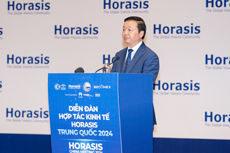 |
| Tran Hong Ha, Deputy Prime Minister, Vietnam, keynoting the meeting |
Speaking at the Welcome Lunch Vo Van Minh, Chairman, Binh Duong Province, Vietnam mentioned after he was elected to his post in July 2021, he then spent 2 years implementing Project 06. Following from this work, Binh Duong has achieved many positive results – the entire province has issued citizen identity cards (ID cards) to 100% of eligible people, and has digitized and simplified many administrative procedures within the National Public Service Portal. Xiong Meng, Executive Vice Chairman, China Federation of Industrial Economics, China agreed, affirming advanced technology had greatly enhanced the stability and modernity of the industrial supply chain. It is necessary to learn from this development experience and steadily promote planning, policy guidance, and talent preparation based on the natural and geographical conditions and regional carrying capacity, so as to promote the long-term sustainable development of regional industries. He also expressed support for deepening economic cooperation between the two countries. He promised to do everything possible to encourage more Chinese companies to invest and cooperate in Vietnam in the future, especially in Binh Duong province. He said the special traditional friendship and comprehensive strategic cooperative partnership between Vietnam and China have been continuously consolidated and deepened, particularly in the economic sphere, with the sides now discussing further joint work in green energy, climate change, and carbon-neutral initiatives.
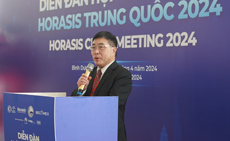 |
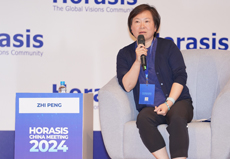 |
| Xiong Meng, Executive Vice Chairman, China Federation of Industrial Economics, China | Zhi Peng, Secretary General, Zhongguancun M&A Promotion Association, China |
The Opening Plenary: Rebuilding Globalization presented discussions about inter-Asian and global trade routes that have been rebuilt after the pandemic, with both China and Vietnam poised to become centers of new global trading routes. The panel was chaired by Thai Linh, Chief Executive Officer, Skills Bridge, Vietnam who explained all staffs must be helped to unlock their full potential by being provided with the tools and inspiration to do so. With Zhi Peng, Secretary General, Zhongguancun M&A Promotion Association, China agreed that broad guidance in in global investment and business operation is needed, and must encompass R&D, management training, investment and now AI. Mike Liu, Vice President and Senior Fellow, Center for China & Globalization, China said that professional experience in digital transformation, operational excellence, cross culture leadership development and market growth strategies were needed skills. Which led to Fu Qiang, Chief Engineer, China Sinopharm International Corporation, China stating capacity-building training can have a huge impact. Anson Chan, Chairman and Managing Director, Bonds Group of Companies, Hong Kong noted the senior leaders must have a broad experience to understand the need for globalization. Nhan Huc Quan, General Director of New Toyo Aluminium Paper Packing Co. Ltd, hoped the Government would stabilize lending rates. According to him, this helps enterprises to calculate production costs and control as well as forecast product price changes in the short-term. This, in return, helps curb inflation. The panel agreed that globalization had never ended, in part because we all rely on goods shipped round the world – what is needed is greater economic cooperation in the future so as to reduce disruptive trade disputes and thus permit business leaders to plan long-term.
The plenary on Spearheading ESG was incorporated within the TSC-Horasis Initiative ‘Race to Zero’ was chaired by Suneet Puri, President China, TCS, China. He explained that his Chinese operation had to accomplish two major aims – to be in accord with the Chinese government’s aims, and to promote the aims of TCS, especially within the realms of the environment, sustainability and governance. Chris Tay, Founder and Chief Executive Officer, Drink NOD International, China noted that “Made in China” brands are leading the way in terms of quality and design. We must all stay ahead of the curve and meet consumers’ ever-evolving preferences. Such ideas were echoed by Nguyen Quang Huan, Chairman, Halcom, Vietnam stated we must respect our business partners, and competition should be for development instead of eliminating each other. To do this suggested Penny Low, Founder, Social Innovation Park, Singapore we need to call for inclusivity, and sustainability must be complemented by a greater awareness of the impact our actions have on the world around us… mindfulness is at the core of everything. This leads to better sustainability said Bill Kung, Founder and Chief Executive Officer, Ecovane Environmental, China who noted there is a wave of sustainable development based on sustainable value. And it is not just about marketing, but we need to ‘Harness the Market to Bring Social Caring’ opined Bonnie Liao, Executive Director, Social Enterprise Research Academy, Hong Kong.
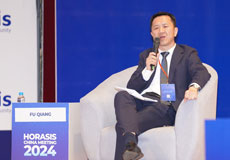 |
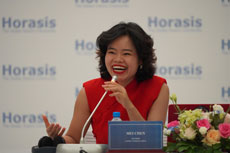 |
| Fu Qiang, Chief Engineer, China Sinopharm International Corporation, China | Mei Chen, Founder, Cosmic Citizens, China, speaking about China’s brands |
The plenary on Nurturing Creativity and Innovation followed. It was chaired by Cuong Dang, Partner and Chief Executive Officer, Forbes Vietnam, who noted Vietnam has been building a large and trusted community for business executives. In essence he, and the panel, agreed that creativity and innovation is a global need and must be organized globally while nurtured locally. Claude Béglé, Chairman, SymbioSwiss, Switzerland described how he engaged with firms to create new ventures to develop entrepreneurial companies, in order to reach concrete and tangible results. Dan Cates, Founder, Dan Cates Foundation, USA was convinced people can work together for the betterment of everyone. Duc Dang, Director, Science Technology Industrial Park, Becamex IDC, Vietnam said we want to engage and identify talent and tap into an innovation ecosystem in order to develop the competitive advantage in new ventures. Then, looking globally, Wang Dong, Executive Director, Institute for Global Cooperation and Understanding (iGCU), Peking University, China hoped that instead of a rivalry that splits the world, the United States and China can lead as responsible stakeholders.
Vo Van Minh, Chairman, Binh Duong Province, Vietnam at the Welcome Dinner addressed the delegates and said that by hosting the Horasis China Meeting, Binh Duong hopes to find important solutions, create favorable conditions for entrepreneurs to access development strategies, and intensify new cooperation to promote economic development. And he stated that during this meeting Binh Duong would be granting investment approval decisions and investment registration certificates to 17 domestic- and foreign-invested projects. Xiong Meng, Executive Vice Chairman, China Federation of Industrial Economics, China replied, stating the special traditional friendship and comprehensive strategic cooperative partnership between Vietnam and China have been continuously consolidated and deepened, particularly in the economic sphere, with both sides now discussing further joint work in green energy, climate change, and carbon-neutral initiatives.
Speaking to the theme Vietnam and China Drive Ahead, Nguyen Van Loi, Secretary of the Provincial Party Committee, Binh Duong Province, Vietnam expressed his joy to have Dr Choi as the Honorary Guest of Binh Duong Province to join Horasis 2024, and to observe the burgeoning partnership between Sunwah Group and Becamex IDC. Jonathan Choi, Chairman, Sunwah Group, Hong Kong replied he was proud that advances over the past 55 years in Vietnam had played a significant role in fostering economic cooperation and mutual development between Vietnam and China. Over the years, our two nations have walked hand in hand, fostering economic collaboration and mutual growth. Recent strategic endeavors by our governments have propelled this relationship to new heights: for instance, instigating Sunwah’s Innovation Centre in Ho Chi Minh City that was launched in 2020 to entrepreneurship development. Our bilateral trade has surged, breaking records year after year. Notably, China’s emergence as Vietnam’s largest customer for agricultural, forestry, and fisheries products highlights the depth of our economic ties.
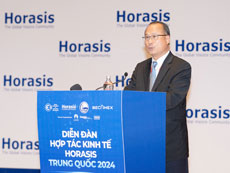 |
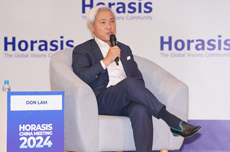 |
| Jonathan Choi, Chairman, Sunwah Group, Hong Kong | Don Lam, Chief Executive Officer and Founding Partner, VinaCapital, Vietnam |
In the plenary discussing the Global Economic Outlook Don Lam, Chief Executive Officer and Founding Partner, VinaCapital, Vietnam noted that, in the context of geopolitical conflicts in the world, the economy has many challenges and uncertainties leading to falling consumer confidence: many people are in a “defensive” position, increasing savings and afraid to invest. Venture capital funds are increasingly difficult to invest in. Tao Yitao, Director, China Center for Special Economic Zones Research, China was anxious that the development process used excessive land resources, and unreasonable housing policies may have pushed up housing prices in China. Currently, China is facing weak consumption pressure after the pandemic, deflationary financial pressure, and a prolonged real estate crisis. She noted that China and Vietnam are two countries with many similarities, so both can learn and share from each other to exploit their strengths, and limit weaknesses in their development process. Yu Jin, Vice President, China National Offshore Oil Corporation (CNOOC), China also noted a double issue – in China as well as Vietnam – human resource training has not kept pace with the development of technology. The issue of human training is the most important in order to grasp and operate technology in the context of the 4.0 industrial revolution. More broadly Felix Zhang, Co-founder, Envision Group, China opined the challenge facing countries around the world today is that geopolitical conflicts are increasingly impacting and greatly affecting their economies. For Asian countries, including China and Vietnam, current short-term challenges are real estate bubbles, public debt, consumption imbalance, high unemployment rate. Long-term challenges are population decline, labor shortage. We must change the development process to keep up with world trends to respond to climate change and grow more sustainably. This Plenary was chaired by Vo Xuan Vinh, Professor, Ho Chi Minh City University of Economics, Vietnam who summarized the session’s speakers agreeing with the need for better human resource training to enhance competitiveness. In addition, we must manage aspects such as green energy supply and better infrastructure. At the same time, it is necessary to focus on building broadband infrastructure, promoting innovation, change, restructuring, and shaping new directions to meet the current green development trend. Shan Baoguo, Deputy President, State Grid Energy Research Institute Co., China noted how cross-region power transmission in China established a multiregional Integrated Resource Strategic Planning Model. The role grid had an important its impact on carbon reduction and power sector development. Cooperation along these lines with Vietnam would benefit both nations as well as reduce emissions with global benefits.
The plenary discussing The Dynamism of Business in a Changing World was chaired by Alejandro Reyes, Senior Fellow, University of Hong Kong, Hong Kong who suggested people-to-people diplomacy, including dialogues organized by university-based think tanks, has become essential to resolving misunderstandings and managing persistent antagonism. He hopes greater togetherness would support a new dynamism, such ideas were supported by Elisabetta Jiang, Co-founder, Unicorns for Good, Singapore as they bring everyone together and empowers conscious leaders to apply and scale technology for greater good. She hoped this will accelerate deep-tech translation into scalable solutions so catalyze the mindset shift for the regenerative transition. Roger King, Founder and Chairman, ODS Holdings Inc., Hong Kong from his wealth of personal experience said he understood mentoring brings new understanding to businesses. Such actions were at the heart of the new business promoted by Duane Kuang, Founding Managing Partner, Qiming Venture Partners, China who stated that investment in innovative companies was a good way forward. Johan Nyvene, Chairman, Ho Chi Minh City Securities Corporation, Vietnam turned to another necessary cog in creating a dynamic business scene – the upgrade of the Vietnamese stock market – so businesses will have more opportunities to access potential foreign investment. Murat Seitnepesov, Chairman, Integral Group, Switzerland emphasized creative leaders need a wide understanding of business. While Zhang Shoujiang, General Manager, Haier Smart Home Vietnam, Vietnam said the products of each business should fit the market, as well as having leaders who were developing production, constantly improving, using quality materials, high technology, so improving productivity as well as the level of perfection in each product. Diversifying product lines according to each distribution channel is key to success.
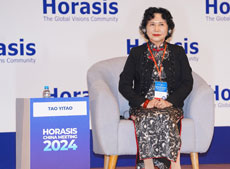 |
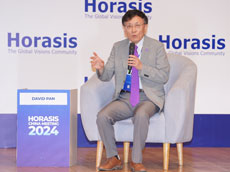 |
| Tao Yitao, Director, China Center for Special Economic Zones Research, China | David Pan, Executive Dean, Schwarzman College, Tsinghua University, China |
The closing plenary was focused on Looking to the Future. It was chaired by J.T. Li, Professor, The Hong Kong University of Science and Technology, Hong Kong recognized through his own wide research upon business there is a need to look beyond profit and success, to promote the betterment of those who are economically weak. This was agreed by Farah London, Founder, Back 2 Business International, United Kingdom who, while having facilitated hundreds of millions in trade and investment around the world, has a particular devotion to caring for the homeless, supporting those with mental health challenges, and helping young people avoid the lure of gang violence through mentoring. Similar sentiments were expressed by David Pan, Executive Dean, Schwarzman College, Tsinghua University, China. He noted that success in business might be measured by dollars, but success in education is measured by happiness. Zhang Huaitao, President, XINFA Group, China echoed his comments and further emphasized the need for education. And there is a ‘something else’ as noted by Charles Tang, President, Brazil China Chamber of Commerce, Brazil. He said his family moved to Brazil when he was just six-years-old, so challenges in the unfamiliar land made him grew up to be a strong and independent man. “Competence and luck bring success. You may be very competent, but if you don’t have luck, you may sometimes not be able to succeed. They go hand in hand.” Finally, Huang Fude, Vice President, JAC International, China reiterated that China would welcome a new stability – new ventures could blossom between China, Vietnam and the world.
The co-chairs were:
| Claude Béglé, Chairman, SymbioSwiss, Switzerland | |
| Dan Cates, Founder, Dan Cates Foundation, USA | |
| Anson Chan, Chairman and Managing Director, Bonds Group of Companies, Hong Kong | |
| Jonathan Choi, Chairman, Sunwah Group, Hong Kong | |
| Fu Qiang, Chief Engineer, China Sinopharm International Corporation, China | |
| Huang Fude, Vice President, Anhui Jianghuai Automobile Group Co., China | |
| Elisabetta Jiang, Co-founder, Unicorns For Good, Singapore | |
| Roger King, Founder and Chairman, ODS Holdings Inc., Hong Kong | |
| Duane Kuang, Founding Managing Partner, Qiming Venture Partners, China | |
| Bill Kung, Founder and Chief Executive Officer, Ecovane Environmental, China | |
| Don Lam, Chief Executive Officer and Founding Partner, VinaCapital, Vietnam | |
| Bonnie Liao, Executive Director, Social Enterprise Research Academy, Hong Kong | |
| Nguyen Quang Huan, Chairman, Halcom, Vietnam | |
| Nguyen Van Hung, Group Executive Chairman, Becamex IDC, Vietnam | |
| Mike Liu, Vice President and Senior Fellow, Center for China & Globalization, China | |
| Farah London, Founder, Back 2 Business International, United Kingdom | |
| Penny Low, Founder, Social Innovation Park, Singapore | |
| Clas Neumann, Senior Vice President, Head of Global SAP Labs Network, SAP, China | |
| Nhan Huc Quan, General Director, New Toyo Company, Vietnam | |
| Johan Nyvene, Chairman, Ho Chi Minh City Securities Corporation, Vietnam | |
| David Pan, Executive Dean, Schwarzman College, Tsinghua University, China | |
| Murat Seitnepesov, Chairman, Integral Group, Switzerland | |
| Charles Tang, President, Brazil China Chamber of Commerce, Brazil | |
| Tao Yitao, Director, China Center for Special Economic Zones Research, China | |
| Chris Tay, Founder and Chief Executive Officer, Drink NOD International, China | |
| Wang Dong, Executive Director, Institute for Global Cooperation, Peking University, China | |
| Yu Jin, Vice President, China National Offshore Oil Corporation (CNOOC), China | |
| Felix Zhang, Co-founder, Envision Group, China | |
| Zhi Peng, Secretary General, Zhongguancun M&A Promotion Association, China |
The Horasis China Meeting is the foremost annual gathering of Chinese business leaders and their global counterparts. The location of the meeting rotates annually, and has been held in Geneva/Switzerland (2005, 2006), Frankfurt/Germany (2007), Barcelona/Spain (2008), Lisbon/Portugal (2009), City of Luxembourg/Luxembourg (2010), Valencia/Spain (2011), Riga/Latvia (2012), The Hague/The Netherlands (2013), Lake Como/Italy (2014), Cascais/Portugal (2015), Interlaken/Switzerland (2016), Sheffield/United Kingdom (2017), Kyiv, Ukraine (2018) and Las Vegas, USA (2019). With this meeting, Horasis aims to present a systemic view of activities affecting the drivers of China’s economic success and how Chinese businesses interact globally within other nations.
 |
Horasis is a global visions community committed to inspiring our future. Horasis’ summits have become some of the most influential high-level global gatherings which every year bring together governments, international organizations, and the business community to offer solutions to global challenges. In addition to the Horasis China Meeting, Horasis hosts the annual Horasis Global Meeting, Horasis Indian Meeting, Horasis Asia Meeting, as well as the annual gatherings of the Horasis Visionary Circle.